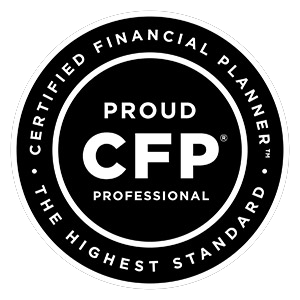
The Certified Financial Planner® certification is recognized as the standard of excellence for the financial planning profession
Most people think all financial planners are “certified,” but this isn’t true. Just about anyone can use the title “financial planner.” CFP Board benefits the public by independently certifying financial planners. Although CFP Board does not guarantee their work, CFP® professionals have met rigorous qualifications for financial planning. Only those who have fulfilled CFP Board’s rigorous requirements can call themselves a CFP® professional.
As part of their certification, CFP® professionals commit to high ethical standards. What’s more, a CFP® professional must acquire several years of experience related to delivering financial planning services to clients and pass the comprehensive CFP® Certification Exam before they can call themselves a CFP® professional.
Working with a CFP® professional can help you find the path to achieving your financial goals. Your goals may evolve over the years as a result of shifts in your lifestyle or circumstances such as an inheritance, career change, marriage, house purchase or a growing family. As you begin to consider how best to manage your financial future, you should feel confident knowing that with a CFP® professional, you’re working with someone who has committed to CFP Board, as part of their certification, that they will act as a fiduciary, and therefore, act in their client’s best interests, at all times when providing financial advice to a client. CFP Board doesn’t guarantee a CFP® professional’s services, but CFP Board may sanction a CFP® professional who does not abide by this commitment.
The Certification Process
The path to CFP® certification is a rigorous but rewarding process that equip advisors to provide comprehensive advice to clients, and help them achieve confidence today and more secure tomorrow.
Education – The two-part education requirement includes both (1) completing coursework on financial planning through a CFP® Board Registered Program, and (2) holding a bachelor’s degree or higher (in any discipline) from an accredited college or university. Advisors must complete the coursework before they can take the CFP® exam. Advisors have 5 years from the date you pass the CFP® exam to complete the bachelor’s degree requirement.
Exam – Passing the CFP® exam demonstrates that the advisor has attained the knowledge and competency necessary to provide comprehensive personal financial planning advice. The CFP® exam is a 170-question, multiple-choice test that consists of two 3-hour sessions over one day. The exam includes stand-alone and scenario-based questions, as well as questions associated with case studies.
Experience – The experience requirement prepares advisors to provide personal financial planning to the public without supervision. Advisors can fulfill the experience requirement either before or after taking the exam. They need to complete either 6,000 hours of professional experience related to the financial planning process, or 4,000 hours of apprenticeship experience that meets additional requirements.
Ethics – The ethics requirement is the final step on the path to CFP® certification. It indicates the advisor has agreed to adhere to high ethical and professional standards for the practice of financial planning, and to act as a fiduciary when providing financial advice to clients, always putting their best interests first.
Sources: https://www.cfp.net/get-certified/certification-process, https://www.letsmakeaplan.org/how-to-choose-a-planner/why-choose-a-cfp-professional